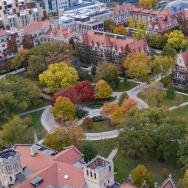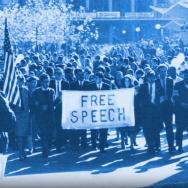University of Chicago President Paul Alivisatos said higher education today is facing deep challenges regarding free expression and academic freedom, and that the Chicago Principles of free expression offer a compelling way forward—not only for universities but for other institutions as well.
Speaking at a Jan. 31 event hosted by the Chicago Forum for Free Inquiry and Expression to mark the 10th anniversary of the Chicago Principles, Alivisatos said: “Some quarters of higher education prize activism over inquiry. Important questions go unaddressed because of fear of the answers, and errors persist because of fear of disagreeing with popular positions.”
That in turn erodes the public’s trust in higher education, he added, and creates openings for government intervention. “When governmental entities or external forces censor the free expression of faculty and students and seek to compel conformity, the possibility for universities to remain places of genuine truth seeking is put at dire risk. This kind of remedy can kill the patient.”
Alivisatos underscored the opportunity for UChicago to expand its leadership on free expression beyond academia, noting the impact of the Chicago Principles over the past decade and the founding of the Chicago Forum in 2023.
“This university is proof enough that the Chicago Principles work,” he said. “I believe they are now ready to graduate. We are expanding their influence through the work of the Chicago Forum, sharing our experiences and insights with other academic institutions, as well as other institutions whose mission derives from their commitment to be truth-seeking.”
Alivisatos’ keynote address set the stage for a daylong discussion of the Chicago Principles—a statement published in 2015 declaring UChicago’s fundamental commitment to free inquiry and expression—which has been adopted by more than 110 colleges and universities. During the event, more than a dozen faculty experts examined the Principles’ origins, their successes and shortcomings, and modern-day challenges to free expression at UChicago and beyond.
Principles not directives
The first panel discussion involved five members of the faculty committee that composed the Chicago Principles in 2014—UChicago Profs. Marianne Bertrand, Geoffrey Stone, Kenneth Warren, Amanda Woodward and Columbia University Provost Angela Olinto. They reflected on the impact of a document that quickly became known beyond the UChicago campus.
“I felt, somewhat naively, and I think wrongly as it turned out, that the document was going to be primarily an inward-facing document whose crucial test would be how it would help us internally to continue to improve as an intellectual community,” Warren said. “No sooner than the president and the provost had accepted our report, the Foundation for Individual Rights and Expression (FIRE) launched a campaign urging other institutions to adopt the Chicago statement.”
Woodward and others noted the Principles were—and are—guidelines, not precise directions. She recalled, soon after the Principles were established, receiving many inquiries from members of the UChicago community who wanted her to judge what was allowable, including one faculty member who planned to write a piece critical of the University administration.
She told him if he felt the criticism was justified, he should write the piece.
“The very healthy thing about our current campus climate is that people debate [the Principles],” said Woodward, dean of the Division of Social Sciences. “There’s been series of discussions among the faculty about: Well, what do these Principles mean? That is the right way to understand our commitment. It’s not static. It’s not a list of bullet points.”
Stone, who chaired the original UChicago faculty committee, acknowledged that “the standards are in some sense are amibugous, and they can and will be applied differently in different circumstances, both by different institutions and perhaps unfortunately, even in the same institution, depending upon the nature of the speech and the timing and the circumstances.”
The faculty committee members went on to discuss whether free speech and academic expression are a direct path to truth; that disagreements are healthy, and the importance of professors teaching students how to disagree.
“The historic moment we are living in is also reminding us that it’s not just a principle,” said Olinto, “but a real effort we need to keep building with courage and humility about what it means and developing for ourselves, but also for the next generation, the ability to listen across differences as much as we can.”
The challenges of social media
The Principles’ origins date to 2014, when schools and universities across the U.S. were disinviting speakers for espousing unpopular views. Then-UChicago President Robert J. Zimmer created the Committee on Freedom of Expression to articulate the University’s commitment to “free, robust and uninhibited debate and deliberation.”
Since then, new challenges have emerged, including social media and artificial intelligence. In a session on technology and free expression, Princeton University Prof. Zeynep Tufekci, who writes for The New York Times, told UChicago computer science Prof. Nick Feamster that the concentration of social media in three or four dominant platforms is problematic.
“Worse for me is that their business model depends on keeping people on the platform,” she said. “The algorithms quickly measured that people want that inflammatory stuff. And so… you don’t see the other side [of an issue.] You see the stupidest caricature of that side because that’s what’s engaging.”
The algorithm “editorializing” prevents substantive, fact-based debate, Tufekci said.
“One person from the other side will say the stupidest thing and that will be shown to a zillion people,” she added, “and the segmentation is so complete that there are very few people that have managed to have audiences in more than part of this with any credibility.”
‘How to summon courage’
The final panel session featured UChicago scholars Adam Green, David Keith, Rochona Majumdar and Deborah L. Nelson. They examined a range of topics—from social media to institutional neutrality to student protest—while reiterating the importance of the free expression of opposing views, inside and outside the classroom.
Green was skeptical of the narrative at UChicago that after campus events where an issue is presented, students return to their residence halls to debate the issue.
“I think if we honestly did this survey within University residence halls after a major talk,” Green said, “we would see a bunch of students on their cell phones looking without necessarily engaging with each other.”
In his research on climate science, Keith said he worries frequently about “groupthink,” but he viewed the principles of free expression as one of the “antidotes” to that problem.
“It’s all too easy for academic communities to become inbred, just like any other human communities,” Keith added, “and I think that has real implications for society when those communities are working on things that matter for public policy.”
Nelson noted that University of Chicago draws students, faculty, staff and administrators from all over the world who bring different experiences and different points of view.
“You just have to figure it out together,” said Nelson, dean of the Division of the Humanities. “What you realize is the pleasure and or benefit of having someone see something that you can’t see. But if you don’t have much experience in that, it might feel slightly treacherous. This is the condition in which we live, and we have got to face it.”
Faculty also discussed protest on campus, including last year’s encampment around the war in Gaza and Israel. (The event itself began with a small protest from audience members who walked out during Alivisatos’ opening remarks.)
“We should acknowledge, if we’re going to have a full discussion …is that there are many, many students who disagree vehemently that they feel welcome when they’re protesting,” Green said, “that they feel heard and acknowledged and respected, that they feel protected by the University in relation to seeking those rights.”
Looking to the future, Green noted the political environment in Washington, D.C. and warned of tests to free expression yet to come. He said that UChicago “is going to be responding to something more powerful than itself that is going to seek to really narrow what it does.”
“And I think that something that would go a long way toward encouraging students to summon courage is to watch the University affirm its principles, its values as well as its interests, exactly as it has done so many times the last ten years. That’s the challenge.”

